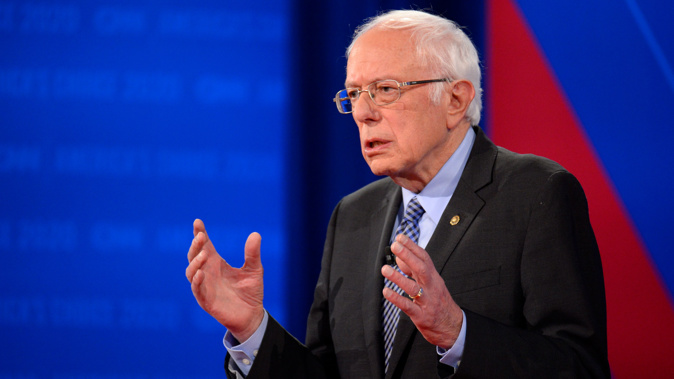
Senator Bernie Sanders has taken a dig at US President Donald Trump while praising New Zealand's efforts for stamping out Covid-19.
Democrat Sanders, who ended his presidential candidacy in April, took to social media to congratulate Prime Minister Jacinda Ardern and the New Zealand Government on the way they handled the crisis.
Since Monday, New Zealand has had zero active cases of Covid-19, following 18 days of no new cases.
Overall, New Zealand has had 1154 cases of Covid-19, with 22 deaths.
Sanders compared New Zealand's actions to those of Trump's as the US has faced at least two million cases and 113,000 deaths so far.
"Congratulations to New Zealand. They listened to science, acted boldly, and had leadership they could trust," Sanders wrote.
"In the US, Trump downplayed the crisis, attacked science and continues to lie. They saved lives. We lost lives."
Sanders' dig comes as New Zealand downgraded to level 1 on Tuesday, allowing more freedoms for Kiwis including mass gatherings and no restrictions on domestic travel. However, border restrictions will remain in place.
Meanwhile, Trump's efforts on the pandemic have been criticised since it began in China.
After the World Health Organisation declared the coronavirus a global health emergency, Trump said the virus was under control in the US.
The following day he suspended entry to the US for some travellers from China, which epidemiologists warned at the time was "more of an emotional or political reaction" than a public health decision.
In February, Trump downplayed the virus two days before the US's first death in California.
He then decided to spread the message that the virus was a Democratic hoax and continually reiterated that it was under control.
Delays in developing a test kit were followed by testing shortages, and both issues meant the coronavirus was able to spread undetected and unabated in many parts of the country in February.
On March 9, Trump compared the virus to the flu, before declaring a national emergency in response to the coronavirus a few days later.
On March 11, Trump addressed the nation in primetime from the Oval Office, announcing a European travel ban and promising economic relief efforts.
Not long after that speech, California became the first state to implement a general stay-at-home order on March 19.
By the end of the month, more than 30 states had done the same, and those shutdowns.
A day after his speech, Trump incorrectly claimed that the Food and Drug Administration (FDA) approved the antimalarial drug hydroxychloroquine for treating Covid-19 before calling it the "Chinese virus" in a press conference.
On March 20 he closed the US-Mexico border while promoting hydroxychloroquine, a malaria drug unproven as a Covid-19 treatment, at the White House Coronavirus Task Force daily briefing.
Days later, the economic impact of Covid-19 lockdowns became more apparent as Trump shied away from a prolonged shutdown.
The US then reached 1000 reported Covid-19 deaths on March 26.
On March 29, Trump extended CDC social distancing guidance through April 30 and said he believed his administration will have "done a very good job" if the US avoids the worst-case 2.2 million deaths predicted by London's Imperial College.
In April, Trump began to blame China, Democratic presidential nominee Joe Biden and the WHO for problems with the US Covid-19 response.
He also targetted Democratic governors who maintained lockdown orders in their states as Trump was eager to open the country back up due to economic losses.
On April 14, he announced his plans to halt funding to the WHO, accusing the organisation of "severely mismanaging and covering up the spread of the coronavirus".
Also during this month, experts had to warn Americans not to inject themselves with disinfectant after US President Donald Trump today hinted that could be a way to cure Covid-19 (even though it isn't).
In May, the US began to lead the world in Covid-19 cases and deaths, reaching a death toll of 100,000.
However, Trump claimed that the US was "the world leader" in responding to the pandemic.
He continued to push states to re-open before saying that they handled the virus better compared to how Obama handled Swine Flu.
On March 18, Trump told reporters that he is taking hydroxychloroquine, an antimalarial drug that has been linked to an increased risk of death when used to treat coronavirus patients.
A week later he bans non-US citizens travelling from Brazil from entering the country before claiming there would have been more deaths if he didn't do his job properly.
Meanwhile in New Zealand, on March 19 its country border closed to everyone except New Zealand residents and citizens and people coming in had to isolate for 14 days
"Protecting New Zealanders from Covid-19 is our number-one priority," Ardern said at the time.
The Government then created an alert level system that the whole country had to abide by.
On March 23, New Zealand went into level 4 lockdown meaning everyone had to stay home unless they were essential workers, or had to make essential travel.
On April 27, the country downgraded to alert level 3 with only a few restrictions lifted.
On May 13, New Zealand downgraded to alert level 2 where businesses could start re-opening and people could expand their bubbles but still have to practice social distancing.
Take your Radio, Podcasts and Music with you









